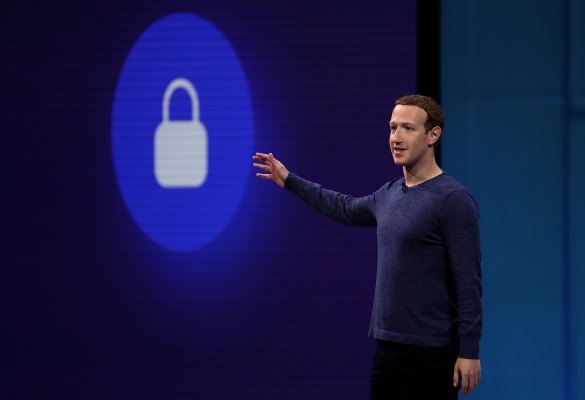With the swelling confidence of a colonial power happening upon a long-settled distant land, today Mark Zuckerberg discovered the concept of privacy.
In a ballooning 3,225 words — a roughly average word count for the terminally verbose Facebook founder — Zuckerberg informed his miserably loyal 2.3 billion plus subjects that his company has happened upon a concept known as privacy, and, in doing so, it sees an opportunity. But can Facebook reform its 15-year legacy as devourer of all things private with a single sweeping, underedited screed from its copycat visionary and dark-pattern technocrat?
Fuck no, of course it can’t.
In articulating his vision, all 3,225 words’ worth, Zuckerberg predictably failed to own the fact that his company singlehandedly created the modern concept of social media as a cash-printing machine that mines our innermost thoughts, desires and connections. The whole thing is a self-parody so on the nose it’s almost boring. And it’s a bummer, because “A Privacy-Focused Vision for Social Networking” could be a compelling declaration (please deliver us!) from nearly any company that isn’t Facebook.
“I believe there’s an opportunity to set a new standard for private communication platforms — where content automatically expires or is archived over time,” Zuckerberg wrote, thinking about privacy for the third time. “…This philosophy could be extended to all private content.”
Unfortunately, no company can build anything interesting in the social media space because Facebook’s well-established wildly aggressive stance toward competitors means that the game is over before the game even begins. If the big blue acquirer doesn’t capture, it kills.
Regulation looms
Surely it’s pure coincidence that Facebook’s sudden interest in privacy comes as the company faces an ever-cresting tidal wave of public backlash and heavy breathing from thirsty regulators in Congress. Sated after sopping up all of the ad dollars drifting around the wreckage of a soul-crushingly monetized social web, Facebook realizes it’s probably time to chart a different path forward. Luckily, it picked up some brands people hate less along the way.
Milking Facebook’s stewardship of WhatsApp for all it’s worth, Zuckerberg was intentional about pitching his new centralized yet private future for Facebook around the model of the encrypted messaging app, a platform so antithetical to Facebook’s broad mission that its founders left in disgust after cashing their checks.
In recent years, the company realized that it’s easier to just to let someone else innovate, build a product and attract users than doing anything very interesting itself. Facebook’s contemporary role in the tech landscape is to either build a functional facsimile of it or swoop in and buy that innovation and keep it at arm’s length from the core Facebook brand for long enough for users to get sort of complacent (users are very good at this).
It’s different with privacy. Privacy is about philosophy. It’s about how you handle things from the start. Facebook effectively stole a whole bunch of shit over a long period of time, relying on intentional obfuscation, legal muscle and user ignorance to pull off the heist. Now, the company is trying to make it out of the store with all that contraband stuffed under its shirt before the security guard ambles back. Unfortunately for Facebook, its hands are stained with a decade and a half of data wrung out of a now cumulative 2.3 billion users.
That’s a lot of exploded fucking ink tags.
This is a company that can barely give us a straight answer about what happens when someone wants their data deleted. One that waited 15 years to introduce something that lets users clear traces of their history, except by most accounts that tool won’t even wipe those records from its servers.
I’m just going to leave these links here.
WhatsApp and encryption are still good
But what about WhatsApp, you (Facebook PR) might gasp, mawkishly. What about that? WhatsApp is the world’s largest encrypted messaging platform — and that’s great. More encryption is good, no matter who owns the wiring. Even Facebook!
Facebook hasn’t killed WhatsApp or hamstrung its encryption and that’s been good too. Still, we don’t owe Facebook anything, least of all our faith that the patron saint of personal data strip-mining does anything good for reasons beyond simply buying up goodwill or getting caught red handed.
In declaring that “people increasingly also want to connect privately in the digital equivalent of the living room,” Zuckerberg senses no irony in the idea that people might not want more privacy within Facebook — they want more privacy because Facebook. Namely, because the company laid waste to the concept of user privacy so thoroughly before apparently flitting off just now to refashion itself into “a privacy-focused messaging and social networking platform” and stuffing users into the WhatsApp-branded life rafts.
Thus, Zuckerberg stumbles out of his great boat, awful blue flag limp on a breezeless shore. All of this is ours, he mutters, gesturing to all of it.
